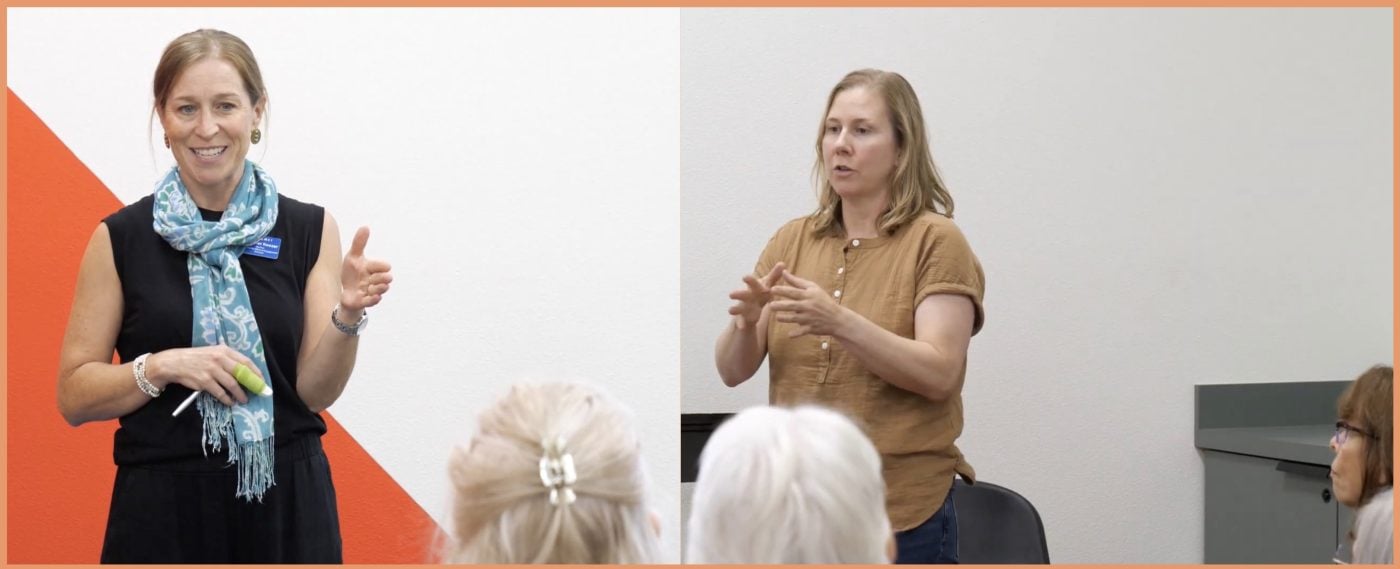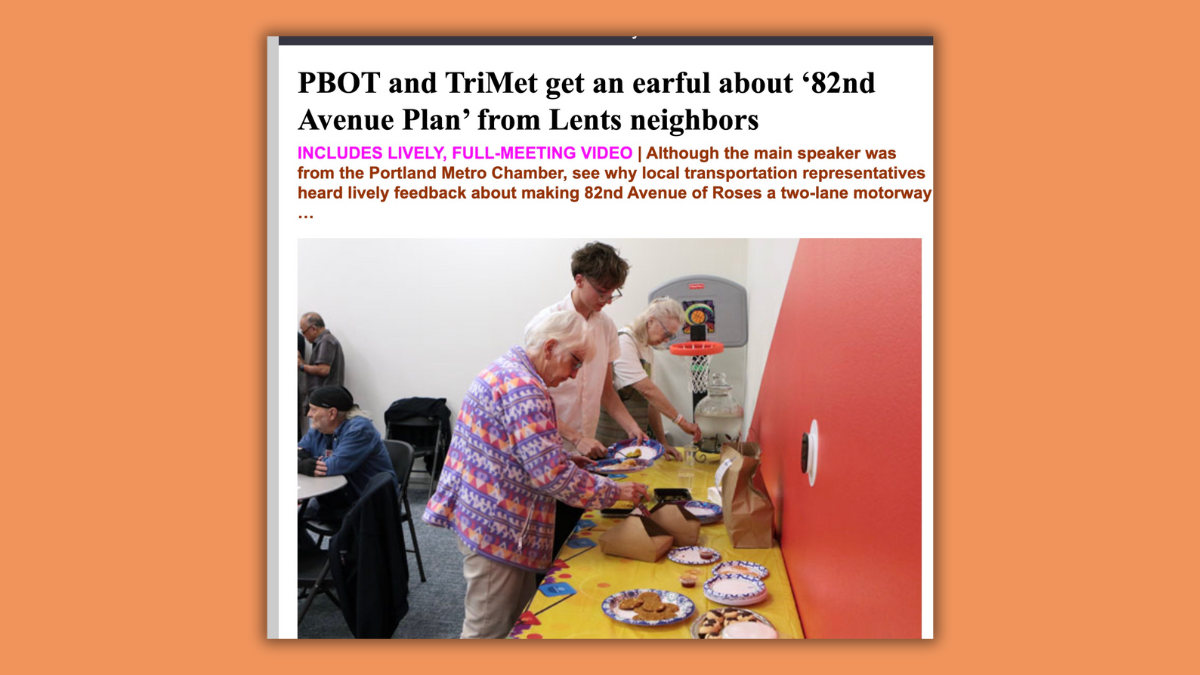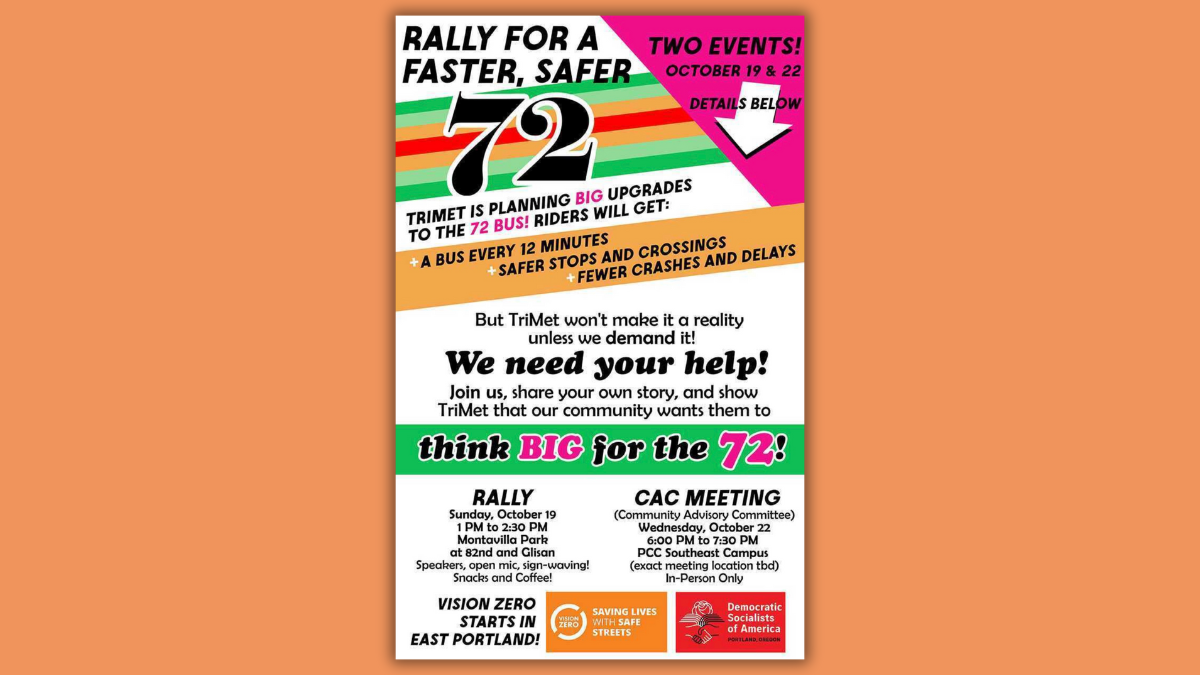
When I last checked in on TriMet’s 82nd Avenue Transit project, I warned that as the project creeps closer to a final design, some advocates worry the agency might decide to cut back on the quality of bus access. In a tale as old as time, it turns out some folks don’t like the idea that the project will decrease driving space on this former state highway, and opposition to the tradeoffs required for faster bus service is mounting.
Since my story last month, I’ve come across video of a meeting of a Southeast Portland neighborhood association that illustrates those concerns (the ones from transit advocates and car users) and I can report an escalation of tactics from bus activists who want to counter project criticisms.
Heated meeting
A headline from East PDX News that read, “PBOT and TriMet get an earful about ‘82nd Avenue Plan’ from Lents neighbors,” recently got my attention. Reporter David Ashton linked to a video of last month’s Lents Neighborhood Livability Association (a splinter group not officially sanctioned by the City of Portland) meeting where Portland Bureau of Transportation and TriMet staff gave a presentation that was repeatedly interrupted by questions and angry comments.
TriMet Director of Community Affairs and Engagement Jennifer Koozer and PBOT Planner Julia Reed remained calm and respectful, despite getting an earful from the crowd.
After hearing about plans for new concrete center medians, one man spoke up to say: “It’s mind boggling! I mean, I’m 82 years old, and I I’ve seen a lot of changes in this city, but… how in the world are they going to get from one side [of the street] to a business on the other without having to go three blocks, make a u-turn, and come back? It’s stupid!”
“It’s inconvenient and it takes up time,” another man chimed in. “That’s wasted time. It doesn’t make any sense because you’re making it inconvenient for the residents and for the businesses.”
“Yes, it can make it less convenient to drive when you have a more circuitous route,” replied TriMet’s Koozer. “But it makes it safer for people who are walking and biking annd prevents the crashes that happen when vehicles are turning left.”
Another man then spoke up: “You guys are cutting down travel for all of us trying to get to work, pick up our kids, for the hospital… You’re making inconvenient and take longer, for what? Why should TriMet get a dedicated lane? We paid for that street over and over and over again. Now you’re taking it away?”
To which Koozer replied, calmly, “I want to think about the people on the busses. We have so many people who use 82nd to get to their jobs, to get to school, to do their shopping — to do their everyday needs… the people who don’t have the choice of using a car — this is to help make their lives easier.”
None of Koozer or Reed’s responses could change the tone of the folks at this meeting — some of whom (only the men) rudely spoke over them and cut them off mid-sentence several times.
“They they want to eliminate the cars!” one man shouted. “That’s the bottom line,” someone in the crowd concurred. “And put everybody on buses and bicycles!”
“TriMet riders are extremely subsidized per ride,” he continued. “Car drivers, with gasoline, maintenance, insurance, etc…, we’re not subsidized. So to put them ahead of us in any kind of priority is demeaning. It’s insulting.”
(Video of the exchanges at the meeting below)
I know neighborhood meetings have a bad reputation and this type of backlash to road projects is relatively common, but I was still shocked by the stuff being said and how the agency staffers were treated. At one point, an elderly man referred to a 1971 memo by a Portland City Hall staffer titled, “Disincentives to the Automobile.” “This outlines everything they’re trying to do… my buddies and I on our hot rods down on Broadway — we were some of the first casualties in [former City Councilor and Oregon Governor Neil] Goldschmidt’s war on cars.”
“So, I can’t believe that this is all just rainbows, unicorns and lollipops. This is premeditated and being done,” he contined.
Despite these disrespectful outbursts, Koozer and Reed maintained their composure. The duo had to repeatedly bat away assumptions that a decision about the business access and turn (BAT) lane was final. Reed said that decision will ultimately be a political one and we should expect it to come from the projects Policy and Budget Advisory Committee at a meeting scheduled for November 7th.
Transit advocates respond
Maybe it’s meetings like these that various activists have heard about. Or maybe it’s the opposition to continuous BAT lanes that have been voiced by some business owners along 82nd. Either way, there’s organizing going on to combat these voices and ensure PBOT and TriMet hear support for a high-quality, dedicated bus lane.
I’ve heard through the grapevine that transit advocates will attend the upcoming Southeast Uplift Land Use and Transportation Committee meeting where TriMet and PBOT will present the project. That’s being held Monday October 20th from 7:00 to 9:00 pm via Zoom (and in person at 3534 SE Main St.)
And the Eco-Socialist Working Group of the Portland chapter of Democratic Socialists of America is organizing a rally to show support for BAT lanes on 82nd on the Sunday before TriMet’s next project community advisory committee meeting. The “Rally for a Safer 72” will take place on October 19th from 1:00 to 2:30 pm at Montavilla Park. Then they encourage everyone to attend the CAC meeting on Wednesday, October 22nd from 6:00 to 7:30 pm at PCC Southeast Campus.
According to DSA’s website, the Eco-Socialist Working Group, “fights for both the long-term and short-term actions necessary for a working class response to the climate crisis, focusing on transit, the relationship between labor and the climate movement, and the defense of Portland’s ecology and environment.” They canvassed 340 riders on 33 different transit routes last spring and found 57% of riders preferred increasing service over any other proposed improvement.
TriMet is about halfway through the design phase of the 82nd Avenue Transit Project. Construction is slated for early 2027.






